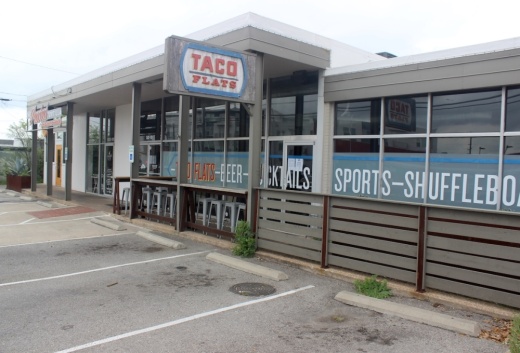But over the last several weeks, Madera said business has fallen 70% as concerns around the spread of the novel coronavirus have turned the global pandemic into a local reality. That decline is expected to continue. On March 17, Austin Mayor Steve Adler and acting Travis County Judge Sarah Eckhardt ordered all restaurants and bars to shut down dine-in service and prohibited gatherings of more than 10 people until at least May 1. Restaurants can still do takeout and delivery. Grocery stores, schools, pharmacies and medical facilities are exempt from the 10-person restriction.
The move further implements social distancing—a technique that experts and officials say is necessary to mitigate the spread of the virus—but leaves people such as Madera with few options.
“There is no strategy, there is no choice; I’m worried about my staff,” said Madera, who opened a second Taco Flats location in Central Austin in October. “I’m going to encourage staff to apply for unemployment. We’ve never had an unemployment case since our company started. These are just crazy times.”
Madera said Taco Flats pays around $20,000 in rent per month. He said he would reach out to his landlord about applying security deposits to April’s rent. They will open counter service at the Clarksville location and open food trucks at their Burnet Road location and their cantina bar, La Holly on E. Sixth Street.
Madera said he will have to lay off "30 to 40" of his 58 employees.
El Chile Group, which runs local restaurants El Alma, El Chile, El Chilito and Yuyo, shut down all of its dine-in services March 16 but is still operating its window service at El Chilito. Owner Carlos Rivero said the move was to protect the health and safety of its customers and 150 employees. Rivero said he is still figuring out what to do for his employees and cannot measure the impact that closing for more than a month will have on his business.
“It hurt so bad when we had to close for an ice storm or inclement weather or flooding, and that was only one to three days,” Rivero said. “That’s so very painful. These are unprecedented times for us. Nothing has come close to this. It’s a little overwhelming at this point. But our first order of business was to get everyone home safe and we’ll figure out the business part later.”
Houndstooth Coffee owner Paul Henry said his four locations will remain open from 7 a.m.-5 p.m. for take-out service. He said they are trying to stay open as long as possible for the sake of their employees and customers, but that they will need help from the government.
“We will continue to pay Houndstooth staff if we are forced to shut down by a government decree, but we can’t sustain that kind of model forever,” Henry said. “Landlords still want to get paid, municipalities still want to get paid, staff still want to get paid, but where is the money going to come from if the economy is near full stop? Federal, state or local governments have to step up in a big way to help small businesses. Payroll tax relief only helps if you still have a payroll.”
Adler said the economic harm caused by the new coronavirus is just as much a crisis as the virus itself. He said officials are well aware of the gravity of this situation and are working to mitigate the impact. Adler called on lenders, landlords and noteholders in the community to recognize that the “old rules are out the window” and that postponing loan payments could be a matter of life and death for businesses.
“Extend grace to the fullest extent that you are able to do that,” Adler said.
He said the larger goal is to bridge the gap so businesses and workers who have been laid off or furloughed can pay critical expenses until the crisis has passed.
For more information about the impact of the city's order on businesses and restaurants, read more here.





